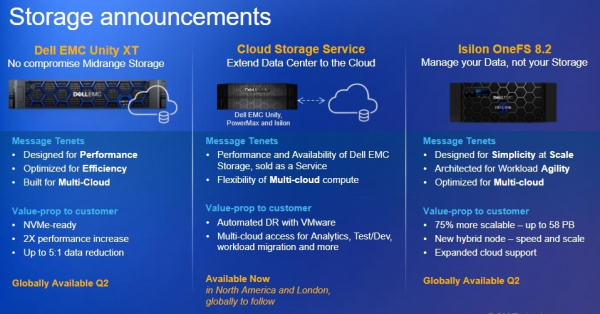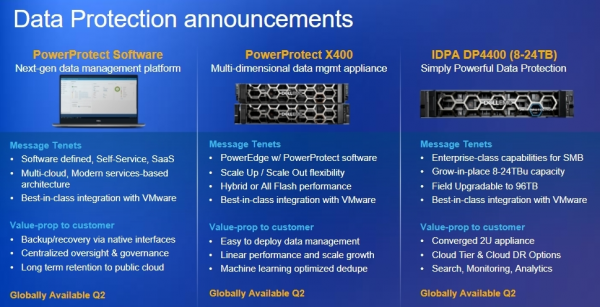Dell Technologies World: Dell Finally Jumps Into Cloud Services
Revealing updates around cloud, storage infrastructure and services plus data management
By Philippe Nicolas | April 29, 2019 at 2:30 pmIt’s first day of Dell Technologies World 2019 and here is a selection among the news of the week.
Some are surprising and reflecting the ambiguous strategy and hesitations illustrating also the erosion of the vendor’ on-premises business.
Obviously, Dell has to react to the growth of the cloud business led by AWS, GCP and Azure followed by IBM, Oracle and of course China ones like AliCloud. This cloud wave promotes software-defined philosophy as it invites users to ignore any hardware locking and pick commodity servers whatever the brand is. We insist here on cloud, storage and data management announcements.
Cloud Platform and Service
This is a real surprise as finally Dell jumps into cloud services with cloud platforms with HCI, CI and other Dell components powered by VMware Cloud Foundation and VxRAIL. To limit the hardware erosion, the last chance for such vendor is to promote hybrid models between on-premises and public cloud instances.
The key point here is this marketing message for a few years from hardware vendors promoting this approach forgetting that the final decision is made by users based on their own advantage and needs not vendors’ ones.
Following AWS Outposts announcements at re:Invent conference in November 2018 and Google Cloud Platform Anthos at recent Google Cloud Next conference, Dell seems to copy that model, at least wishes.
The company confirms as well Project Dimension unveiled last August and marketed by the blog post by Kit Colbert, CTO of the platform business unit, VMware.
The interesting sentence is the one at the end of the second paragraph in the Background part: “In other words, customers wanted the cloud experience, where infrastructure is delivered as-a-service, but they wanted it on-premises.”
Users wish to reduce cost, maintain same level of service and even improve it and services will be a mixed of on-premises and cloud and even many of these services can migrate to the cloud as soon as the service and cost are good enough and deliver gains. And if you read carefully that post and understand Project Dimension, it’s about customize hardware at the factory so again something proprietary and what about all systems already deployed and used by users?
This Data Center as-a-Service is fully managed by Dell really capitalizes on VMware tool sets. There is no mention of Kubernetes on Dell EMC slides announcing the services, VMware Cloud Foundation web page and the blog post mentioned above. This is pretty amazing as we all know the de-facto status on the market of Kubernetes orchestration solution. But how the company can embrace Kubernetes intelligently having VMware product line in its own basket. Not easy for sure but many enterprises ask for it. Not mentioning Kubernetes when you cover cloud represents a strategy mistake as the vendor goes against an industry clear and now obvious move supported by hundreds of companies and cloud giants. Kubernetes means also cloud independence that is orthogonal with the proprietary world of VMware even if VMware is widely adopted. I told you, the key question is “how could the hardware erosion be limited or reduced?” but the clock is ticking…
The good thing for Dell versus other systems vendors is they can resist to the cloud absorption leveraging VMware portfolio that is a real gem and advantage for sure.
Storage Infrastructure
Dell EMC announces at the same time three new product iterations related to Unity, Isilon and a cloud storage service.
For Unity, the company unveils the XT model with better performance, NVMe ready and 5:1 data reduction. It will be available in 2Q19.
For the Scale-out NAS line, OneFS 8.2 is released with a new maximum capacity of 58PB, a new hybrid node and the wish to be multi-cloud but as far as we know, Isilon runs only on-premises and coupled with Google Cloud Platform. Does it mean Dell EMC think to make it available for AWS and Azure, they can but it exists already tons of solutions. Readers can check a recent file storage table published when Qumulo announced GCP recently.
Dell also made a surprising acquisition in August 2018 with DataFrameworks trying to solve the integrated real-time analytics challenge provided by solutions like Qumulo. This new OneFS release will be available also in 2Q19.
And Dell EMC provides a new data transfer service, Cloud Storage Service, available now in North America and London, to move data from on-premises to cloud supporting PowerMAX, Unity and Isilon.
Data Management
Dell EMC is also famous for the EMC data protection acquisitions with Avamar, Legato and Data Domain. The company announces PowerProtect Software, a self-service SaaS multi-cloud data protection.
PowerProtect X400 is also unveiled, a PowerEdge-based appliance coupled with PowerProtect Software with hybrid storage or full flash and optimized de-dupe thanks to ML.
And finally a new IDPA (Integrated Data Protection Appliance) with the DP440 model, 2U, for SMBs, from 8 to 24TB per U, upgradable to 96TB with cloud options for tiering and DR and search capabilities.
All these three products are of course integrated with VMware and will be available in Q2.
And there was few others announcements related to Latitude with 7000, 5000 and 3000 series and some interesting ones related to SD-WAN following VeloCloud by VMware end of 2017, DSS 8440 server with NVidia Tensor Core GPUs, VxFlex , VxRail and PowerSwitch S5200-ON. It’s important to mention also two interesting partnership extensions with BigSwitch and Pica8.















 Subscribe to our free daily newsletter
Subscribe to our free daily newsletter

